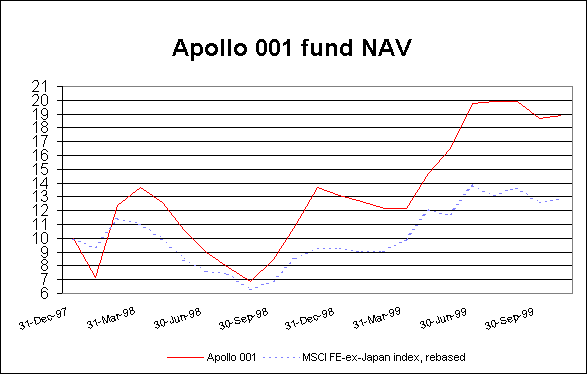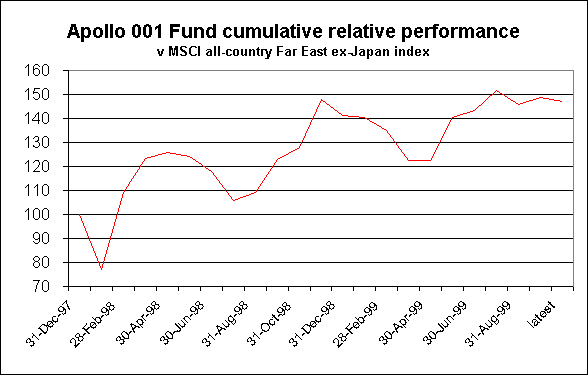Apollo
Investment Management
Interesting times ahead!
& hence, opportunity
Apollo 001 Fund: the manager's 3Q99
report
The Fund's NAV fell 6% in September, to US$18.68, resulting in a decline
of 5.4% for the third quarter, and reducing the year-to-date gain to 42%,
before fees. Judging by today's AWSJ reports of the Lipper mutual fund
universe, both the 3Q and year-to-date performance on a fee-adjusted basis
would be comfortably above the average, and we are also looking respectable
against the most relevant of the MSCI regional indices. However, I keep
an eye on these only to make sure that we are not looking stunningly foolish,
and to explain the backdrop to short-term valuation movements, as I am
much more interested in absolute returns, and the risk/reward balance on
the bets which we do decide to take. We take no account of index weightings,
and most fund managers would consider our portfolio highly concentrated
(15 holdings at present, with 82% of the value represented by the top 8),
and decidedly eccentric (they might well use the word "boring"). That's
fine by me.
The biggest risk to Asian financial markets comes from Wall Street.
I've been nervous about this for so long that I, like other bears, may
have little credibility on the subject (the Cassandra syndrome), but with
a Dow Theory bear signal in place and an impressive array of technical
indicators flashing red, it does now look as if the mania is crumbling.
Maybe we will see the dip-buyers return this week with their former bravado,
but I would not be surprised to see serious carnage in the weeks ahead.
(This would confirm October's short-term place in market legend, although
I am inclined to agree with Mark Twain on the subject.)
In this event, I would not be surprised to see serious short-term valuation
losses on our portfolio - but the damage to intrinsic value of the businesses
we own would be much less. This is because the companies we own have strong
balance sheets and very solid business franchises, and are in aggregate
extraordinary cash-generators. One can go on to worry about global depression,
starting with bleak scenarios of the 1930's and the eventual political
fallout, with plenty of flashpoints and political risks on our doorstep
to heighten the nightmares - but it would take a disaster of this magnitude
to put a serious dent in the cashflows of some of our more recession-resistant
companies (such as fast-food operator Cafe de Coral, Hong Kong's major
purveyor of hospital meals and school lunches). Meanwhile, (1) it may not
be that bad, (2) mere financial depression with the economic fabric intact
may present tremendous strategic opportunities to the well-run and cash-rich
companies, (3) bear markets are a bargain-hunter's delight.

Market timing being a game at which I claim no prowess, I fall back
on fundamental valuations. On my estimates, our portfolio (at the latest
NAV of US$18.90) is on a current year earnings yield of 15%, and prospective
one year out of almost 18%. The dividend yield, after Asian taxes, is expected
to be just under 8% this year, and a touch higher next. Compare these with
the deposit rates at your local bank. How accurate are the numbers?
I spend more time thinking about the strategic positioning and broad valuations
of our companies than the blips and dips in the earnings figures, but I
find this particular group of companies gives me pleasant surprises more
often than they disappoint. These valuations, anyway, give more than adequate
margin-of-safety from the fundamental investor's perspective. Even if one
is nervous about the big picture, value like this is hard to ignore. (I
stress as always that we make no concessions on quality, and would never,
in Asia, buy stocks just because they "cheap". Nor do we buy only the cheap,
as previously discussed. These are good companies - and the list of new
ideas which I want to research is as long as it has ever been.)

Meanwhile, there are a number of potential positives from a top-down
perspective. Firstly, it is possible to envisage a soft landing for US
financial markets and hence the US economy, which would allow investors
to rotate into Asian economies offering higher growth and better value.
Secondly, Y2K disruption is absurd, and many investors are reportedly staying
clear of dodgy-compliance countries. If not too much chaos ensues, the
burst of pent-up demand to buy Asia in January could cause a New Year rally
fit for - well, fit for the New Millennium. One fund manager friend told
me recently that they were under pressure from trustees to move 25% into
cash, with a view to reinvesting in the New Year! Thirdly, even without
Y2K, there is always a temptation for fund managers to sit back after a
strong performance and "lock in gains" for the remainder of the year; for
those susceptible (and the reality is that many incentives are based on
the calendar year), I suspect that temptation will now be particularly
strong.
Chris Wood at ABN-Amro has just published a 106-page blockbuster proclaiming
boldly that "Asia remains in a bull market, though Wall Street and Y2K
concerns will keep sentiment cautious in the final quarter... Investors
should use weakness in America as an opportunity to buy in Asia, not as
a risk to run away from... In both [China and Japan] there is growing,
albeit still tentative, evidence that deflationary pressures have peaked
out... [There is] potential for sustained non-inflationary growth in Asia,
along the lines of the US Goldilocks model, [given] the continued absence
of credit growth as a result of the continuing hangover from past excesses...
The bull theme [in Asia] will switch from deleveraging to info tech. The
new economy will serve as a catalyst both to revolutionise the way companies
are run and to free up long pent-up consumer demand resulting in a genuine
long-term growth story... It is precisely because so many aspects of the
traditional Asian business model are so inefficient that the new economy
has so much potential... Its catalytic role will actually be greater in
Asia than it has been in already lean and mean America... Asia can go forward
regardless of any setbacks, violent or otherwise, emanating from the US."
I recommend this report (Asia Maxima - Mission Possible) for
a wealth of useful charts, my favourite of which is their established Jack
and Bill Index. This shows that the whole of Asia-ex-Japan, including India,
was capitalised at end-Sept at only twice the combined market cap of General
Electric and Microsoft. The ratio peaked at 12 in December 1993, and the
average for the 90's has been about 7 - so US investors taking their chips
off the home table could, if they wished, get more than usual for their
money. (In practice, of course, most of them are quite disillusioned with
overseas investing, whereas "US equities always go up in the long run",
so they stack even more chips on the recent winner. Asians have more recent
experience of volatility and of markets heading to oblivion, but retain
an equally touching faith in the long-run virtues of property.)
I'd also like to recommend Marc Faber's recent essay "Is the recovery
in Asia for real?", especially for those at a distance, for Marc as
always provides some excellent reality checks. "The Asian countries
haven't suffered for long enough to bring about true reforms... Crony capitalism
is alive and well; in fact the crisis may actually have led to more - not
less - corruption, as everyone is desperate to make back what they lost
over the last two years... In most Asian countries the political situation
is tense." However, Marc too is struck by the speed with which the
Internet is changing the Asian economic landscape. Writing in the first
half of September, he concluded that there was then "no urgent need
to purchase Asian equities, as the markets are more likely to provide a
better entry point towards the end of this year or early next year",
but that "Asian economies will offer great investment opportunities
in the future; not necessarily in Hong Kong banks and property stocks,
but in new industries and in new regions and with new entrepreneurs. Devastating
bear markets tend to bring about a change in leadership. New countries,
new industries, and new companies will be leading the next secular bull
market."
What a great time to be a cherry-picker!
Claire Barnes, 18 October 1999
Previous reports:

